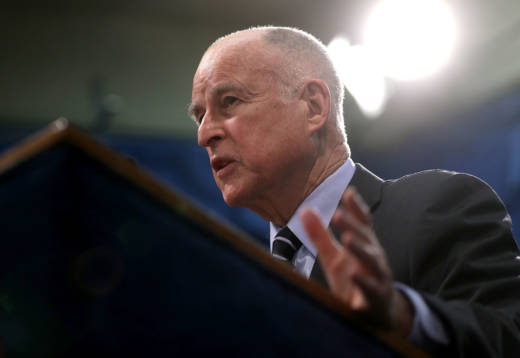The ballot measure is backed by a segment of law enforcement officials who have been critical all along of the laws Brown pushed in order to reduce the state’s bloated prison system. The 19-page measure is a grab bag of sorts aimed at rolling back many of the criminal justice changes initiated by lawmakers, Brown and voters since 2011.
Democratic Elk Grove Assemblyman Jim Cooper, a former police officer helping spearhead the initiative, said one of the most important changes proposed under the ballot measure is the expansion of what’s considered a “violent” crime under state law. By changing that definition, the initiative would limit who’s eligible for release from state prison and potentially result in more offenders being sentenced to state prison instead of county jail.
“Right now California crimes that are considered nonserious and nonviolent — and that allow you to get out of jail or prison earlier — are drugging and raping somebody, raping a developmentally disabled person, spousal abuse, a drive-by shooting, human trafficking of a child. So a myriad of different crimes, some 17 to be exact,” Cooper said. “The public never had any idea. These were not considered serious or violent crimes in the state of California. When they hear it they’re shocked.”
Cooper is referring to Proposition 57, a 2016 ballot measure written by Brown that made it easier for prisoners who participate in rehabilitation programs to win release. The initiative applied only to people convicted of crimes considered nonviolent under state law — a short list created years ago that in fact does exclude some heinous-sounding offenses.
But Brown says the list of so-called violent crimes includes only a handful of the 5,000 crimes on the books in California and that critics could keep adding new ones “virtually forever.”
He said the goal of Proposition 57 was simply to give prisoners an opportunity and incentive to participate in rehabilitation programs — under the measure, inmates who do so are more likely to be granted parole.
“The point is, should people who spent 10 or 20 years in prison have a chance at parole?” he said, noting that the parole board rejects 75 percent of releases and is made up mostly of retired law enforcement, who consider someone’s criminal past and how they have behaved in prison.
The governor said removing the opportunity for rehabilitation and release gives power to prison gangs.
“Unless there is an option, like ‘Stay away from the gangs and you can get out of prison earlier,’ then the gangs hold full sway and the prison authorities have no alternate reward,” he said.
Since before the governor took office in 2011, California has been under a federal court order to reduce its prison population by 40,000 inmates. Lawmakers and voters have passed a series of criminal justice reforms over the past seven years, several crafted by Brown, that have aimed to reduce that population and help offenders succeed both while they’re incarcerated and once they’re released.
The two that stand to be watered down the most under this proposed ballot measure are 2016’s Proposition 57, which gave the parole board more discretion in prison release decisions; and Proposition 47, a 2014 ballot measure that reduced most drug possession felonies to misdemeanors and raised the threshold for felony shoplifting theft from $450 to $950.
Retailers complain that change has resulted in an explosion of organized retail theft rings. Those thieves, they say, know that they won’t be charged with a felony unless they steal more than $949 worth of merchandise at a time.
That’s why some large grocery chains, including Albertson’s, Raley’s and Grocery Outlet, are bankrolling the proposed ballot measure. Other retail groups are working with Brown and lawmakers to create a new “organized retail theft” crime through the legislative process and have disavowed the ballot measure.
One outstanding question is whether counties will have enough time to count the signatures before June 28, the deadline to place a measure on the November ballot. If they miss that deadline, the ballot measure wouldn’t appear before voters until 2020.
Cooper said he’s confident there’s plenty of time for the count, noting that Brown’s Proposition 57 qualified two years ago in the same time frame.
“So there’s no reason ours shouldn’t make it on the ballot this year unless somebody tries to sabotage it,” he said.

